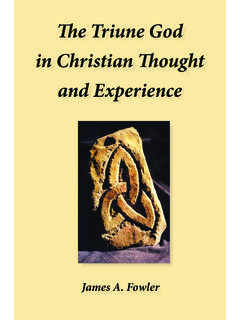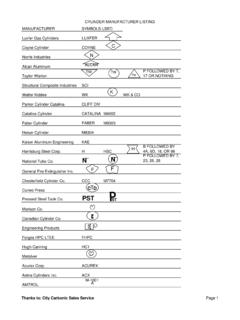Transcription of LOVE - Christ in You Ministries
1 love . I. Words for " love " in original Biblical languages A. Hebrew words 1. Hebrew word ahab - spontaneous, impulsive love (250 times in OT). 2. Hebrew word hesed - deliberate choice of affection and kindness 3. Hebrew word raham - to have compassion, brotherly love B. Greek words 1. Greek word eros - get English word "erotic". a. Eros was Greek god of love - sensual, sexual, impulsive b. Plato defined this love as aspiring for and delighting in the value of its object; loving that which is lovable. c. This Greek word not found in New Testament 2. Greek word philia - get English words philosophy, philanthropy, philology, bibliophile, Philadelphia, Philip, etc. a. Greeks used as love for friend, spouse, children b. Ex. of NT usage: Matt.
2 10:37; Lk. 12:4; 14:12; Jn. 11:3,36. 3. Greek word agape a. Seldom used in secular Greek literature b. When used referred to selective desire for something or someone. c. Greek OT (LXX) used over 300 times to refer to God's selective and exclusive love for Israelite people. d. Predominant word for love in new covenant (over 250. occurrences in NT). Invested with new meaning. e. Representative Biblical references employing agape Matt. 5:43,44 - " love your enemies". Matt. 22:36-40 - "great ". Jn. 3:16 - "God so loved the world He gave His only Son". Jn. 13:34; 15:12 - "new one ". Jn. 17:26 - " love wherewith Thou loved Me may be in them". Rom. 5:5 - " love of God poured out within our hearts". Rom. 13:10 - " love is the fulfillment of the law".
3 I Cor 13:1-13 - "..the greatest of these is love ". II Cor. 5:14 - "the love of Christ controls us". Gal. 5:6 - "faith working through love ". Gal. 5:22 - "fruit of the Spirit is ". I Jn. 4:7 - "everyone who loves is born of God". II. Divine basis of love A. Character of God - "God is love " - I Jn. 4:8,16. 1. Essentially a. Absolute and independent, unnecessitated b. immutable and uncompromising c. personal, relational, fundamental to triune Godhead d. Self-giving; other-oriented; desires the best for all others, and the best is Himself. 2. Comprehensively a. All-encompassing expression of God's character Rom. 13:9 - "summed up in 'you shall love your neighbor'". Gal. 5:14 - "whole law summed up in ' love your neighbor'".
4 James 2:8 - "royal 'you shall love your neighbor'". b. Other attributes of God's character expressed in love Exod. 20 - honor, respect, truth, loyalty, fidelity,.. I Cor 13 - patience, kindness, truth, eternality Gal. 5:22 - joy, peace, patience, goodness, B. Expression of God's character 1. Objectively a. God's love is expressed by His grace - Eph. 2:4,5. b. God's grace realized in Jesus Christ - Jn. 1:17;3:16; Titus 3:4. c. God's love expressed in redemption - Rom. 5:8; Gal. 2:20;. I Jn. 4:10; Rev. 1:5. 2. Subjectively a. God's character of love to be expressed in behavior of man b. Requires regenerative presence of God's character Jn. 17:26 - " love may be in them, as in Me". Rom. 5:5 - " love of God shed in our hearts".
5 Gal. 5:22 - "the fruit of the Spirit is love ". I Jn. 4:7 - "everyone who loves is born of God". c. Only God can express His character of love (1) love not a virtue, value, ideal, moral principle (2) love not a feeling, sentiment, impulse, passion (3) love not romance, benevolence, amicability (4) love not psychological predisposition, physical genetics, social habit (5) love expressed only as derived from God - ek theos (6) love is spiritual character of God in Christian d. love commanded of the Christian -Jn. 13:34; 15:12; Eph. 5:2. (1) Freedom in the receptivity of His character (2) God is the dynamic of His own demands III. Practical features of the expression of God's love A. love is not defined by the act, but by the character of God within the act B.
6 love precludes hypocrisy and play-acting. C. love is unselfish; not based on self-need or want. D. love is not conditioned on reciprocity or calculation of repayment. E. love doesn't care who gets the credit. F. love is active; not merely passive or theoretical; love doesn't loiter. G. love believes, trusts and expects God to overcome all things. H. love is directed toward people; not things, ideas, doctrines, I. love of neighbor desires them to have everything you have, and more. J. love precludes resentment, covetousness, and judging another. K. love seeks to commend, not condemn. L. love is not conditioned on the lovability or action of the recipient. M. love is not fickle; it is unchanging and limitless N. love precludes despair at the loss or absence of the person loved O.
7 love precludes favoritism and aversion. P. love does not engage in comparison. Q. love is not possessive, seeking to own or control another person. R. love does not find its identity or life in the one loved. S. love is the antidote to fear and paranoia - I Jn. 4:18. T. love seeks the highest good of the other, with no thought of benefit to oneself. U. love involves self-denial, self-renunciation, personal sacrifice, humility V love is willing to suffer slights, hurts, abuse. W. love builds others up, nurtures, edifies; it is constructive, not destructive X. love seeks to avoid grieving or offending another - Rom. 13:10; 14:15. Y. love of one's enemy removes his relation of power - Matt. 5:40. Z. love precludes partiality, preference, distinction, exclusivism; it is universal and equal AA.
8 love does not take the situation into one's hand to resolve the problem. BB love does not preclude confrontation, opposition and discipline - Heb. 12:6;. it is not always capitulatory or soft ("tough love "); cf. Matt. 10:34; Lk. 12:49. CC. love cannot be coerced or obliged by law or moral principle and program. DD. love is not retaliatory (Rom. 12:17); it turns the other cheek (Matt. 5:39). EE. love does not dictate performance standards or expectations to others FF. love prompts one to take the initiative to be the first to act - (Matt. 7:12). GG. love dissolves the emotional blocks which keep us from sensitivity to others HH. love does not demand its personal rights II. love excludes suspicion and mistrust JJ. love allows one to be free to be man as God intended man to be.












